Much has been made of the film adaptations of Pride and Prejudice and the need to make the feelings of the hero more apparent to the viewer, the complaint being that Jane Austen really doesn’t give us much to go on regarding her Heroes and their inner life. Andrew Davies famously says he had to “sex her up” to make the films work for a modern audience, and while I like to see Colin Firth in a wet shirt and Matthew Macfadyen bare-chested at dawn as much as the next swooning female, I do take issue with the need to edit the text to the point of it seeming more like a modern romance than an early nineteenth-century novel. One of Jane Austen’s greatest strengths and why we still read her year after year over the past 200 years, is her creation of believable characters who live and breathe on and off the page – and the need for our imaginations to bring whatever we will to the reading…
P&P 2005 – Matthew Macfadyen as Mr. Darcy
This year has brought with it any number of celebrations of Pride and Prejudice from plays and festivals to conferences and all sorts of fan fiction and games and “stuff” one cannot live without, but the best way to celebrate the book in my mind is to just find a quiet corner somewhere and re-read it, perhaps for the umpteenth time, but read it again nonetheless. We know from her letters that Jane Austen read the book aloud to her family any number of times – whether she read it during and after the many alterations she made to the text is not so clear … but her family began what has become for many of us an annual reading, and we enjoy it as much as they did, our only loss in not having Austen to answer our questions –
I began this year of celebrating the bicentenary of P&P with a close reading in January, my intention to make note of every time Austen comments as the narrator or has Darcy express or state anything regarding his feelings for Elizabeth Bennet, as well as her feelings in return – and I find so much more than I ever thought was there, and seeing them out of context is quite enlightening – I don’t think that Andrew Davies had to add anything at all to the text – it is already there, as you shall see.

P&P 1995 – Colin Firth as Mr. Darcy – “The Look”
John Wiltshire recently wrote an essay on “Mr. Darcy’s Smile” ** – and one might have asked ‘did Mr. Darcy EVER smile?’, our first impression no different than Elizabeth’s in assigning him to the Snob pile. Professor Wiltshire rescues him from that place of the aloof, observing, not present fellow, by telling us how often in the text Jane Austen has her Mr. Darcy actually Smile. So let’s see what we find, see what Austen tells us directly about Darcy’s feelings – for some reason we gloss over it all too easily and have come to depend upon Andrew Davies to visually remind us …
The other vexing question is of course when does Elizabeth fall for Mr. Darcy? This is a controversial point – some believe her tongue-in-cheek statement to Jane,
“It has been coming on so gradually, that I hardly know when it began. But I believe I must date it from my first seeing his beautiful grounds at Pemberley.”
-this one sentence dividing Janeites, scholars and fans alike as to Elizabeth’s perhaps overly mercenary view of the world and her need to “land” a wealthy partner, that “to be mistress of Pemberley might be something!” Some don’t see Elizabeth at all attracted to Darcy with any sort of passion like the films are overwrought with – that she comes to admire and then Love Darcy because of all his good qualities once his Asperger / shy/ snob demeanor crashes around him… But again, reading the text closely, both the actions, dialogue, and the narrator’s commentary, we are shown an Elizabeth both humiliated by Darcy’s apparent disdain of her [and her eager willingness to accept the neighborhood gossip that disses him at his first appearance], and her awareness in every moment they are in the same room together, of everything he is doing – she sees him watching her mother, reacting to her mother and other family members, sees him change color upon meeting Wickham, watches closely his relationship with Caroline Bingley, and most importantly sees him watching her, always passing it off as some strange behavior on his part, protesting too much because she knows he cannot tolerate her – in short she is always in a state of heightened awareness whenever Darcy is in her space. What changes for her at Pemberley is not its grandeur and its grounds, but his portrait, where she for the first time can look at him directly, his eyes upon her as in life, “with such a smile over [his] face, as she remembered to have sometimes seen, when he looked at her” (p. 189), but here she does not have to turn away in a confused embarrassed state…
“In earnest contemplation” – H. M. Brock. P&P. Dent, 1898.
Image: Adelaide ebook
I had wanted to post on this as this celebratory year began, but here I am nearly the end of the year and ready to launch into celebrating Mansfield Park !– but shall post these quotes now, just under the wire… starting today with Volume I. *
From Volume I:
p. 7. [where it all begins! – Darcy’s insult, Elizabeth’s humiliation and wounded pride]
“Which do you mean?” and turning round, [Darcy] looked for a moment at Elizabeth, till catching her eye, he withdrew his own and coldly said, “She is tolerable; but not handsome enough to tempt me; and I am in no humour at present to give consequence to young ladies who are slighted by other men. You had better return to your partner and enjoy her smiles, for you are wasting your time with me.”
Mr. Bingley followed his advice. Mr. Darcy walked off; and Elizabeth remained with no very cordial feelings towards him. She told the story, however, with great spirit among her friends; for she had a lively, playful disposition, which delighted in any thing ridiculous.
C. E. Brock. P&P. Macmillan 1895
p. 13. [but Elizabeth later says:]
“That is very true,” replied Elizabeth, “and I could easily forgive his pride, if he had not mortified mine.”
p. 16. [How quickly Darcy changes his mind about Elizabeth!]:
Occupied in observing Mr. Bingley’s attentions to her sister, Elizabeth was far from suspecting that she was herself becoming an object of some interest in the eyes of his friend. Mr. Darcy had at first scarcely allowed her to be pretty; he had looked at her without admiration at the ball; and when they next met, he looked at her only to criticise. But no sooner had he made it clear to himself and his friends that she had hardly a good feature in her face, than he began to find it was rendered uncommonly intelligent by the beautiful expression of her dark eyes. To this discovery succeeded some others equally mortifying. Though he had detected with a critical eye more than one failure of perfect symmetry in her form, he was forced to acknowledge her figure to be light and pleasing; and in spite of his asserting that her manners were not those of the fashionable world, he was caught by their easy playfulness. Of this she was perfectly unaware; — to her he was only the man who made himself agreeable nowhere, and who had not thought her handsome enough to dance with.
He began to wish to know more of her, and as a step towards conversing with her himself, attended to her conversation with others. His doing so drew her notice. It was at Sir William Lucas’s, where a large party were assembled.
“What does Mr. Darcy mean,” said she to Charlotte, “by listening to my conversation with Colonel Forster?”
[and the teasing begins!]
p. 18. Sir William Lucas:
C. E. Brock. P&P. Dent, 1898. [Mollands]
“My dear Miss Eliza, why are not you dancing? — Mr. Darcy, you must allow me to present this young lady to you as a very desirable partner. You cannot refuse to dance, I am sure, when so much beauty is before you.” And, taking her hand, he would have given it to Mr. Darcy, who, though extremely surprised, was not unwilling to receive it, when she instantly drew back, and said with some discomposure to Sir William —
“Indeed, sir, I have not the least intention of dancing. I entreat you not to suppose that I moved this way in order to beg for a partner.”
Mr. Darcy, with grave propriety, requested to be allowed the honour of her hand, but in vain. Elizabeth was determined; nor did Sir William at all shake her purpose by his attempt at persuasion.
“You excel so much in the dance, Miss Eliza, that it is cruel to deny me the happiness of seeing you; and though this gentleman dislikes the amusement in general, he can have no objection, I am sure, to oblige us for one half-hour.”
“Mr. Darcy is all politeness,” said Elizabeth, smiling.
“He is indeed; but considering the inducement, my dear Miss Eliza, we cannot wonder at his complaisance — for who would object to such a partner?”
Elizabeth looked archly, and turned away. Her resistance had not injured her with the gentleman, and he was thinking of her with some complacency…
p. 19. [Darcy to Miss Bingley who is ever in pursuit…]:
“Your conjecture is totally wrong, I assure you. My mind was more agreeably engaged. I have been meditating on the very great pleasure which a pair of fine eyes in the face of a pretty woman can bestow.”
Miss Bingley immediately fixed her eyes on his face, and desired he would tell her what lady had the credit of inspiring such reflections. Mr. Darcy replied with great intrepidity —
“Miss Elizabeth Bennet.”
“Miss Elizabeth Bennet!” repeated Miss Bingley. “I am all astonishment. How long has she been such a favourite? — and pray, when am I to wish you joy?” …
p. 24. [Elizabeth arriving at Netherfield to offer comfort Jane]:
Mr. Darcy said very little, and Mr. Hurst nothing at all. The former was divided between admiration of the brilliancy which exercise had given to her complexion, and doubt as to the occasion’s justifying her coming so far alone. The latter was thinking only of his breakfast.
Kiera Knightley as Elizabeth – image: jasna.org
p. 26.
“I am afraid, Mr. Darcy,” observed Miss Bingley, in a half-whisper, “that this adventure has rather affected your admiration of her fine eyes.”
“Not at all,” he replied; “they were brightened by the exercise.”
p. 28. [this is an interesting: Elizabeth has been reading a book while the others plays cards – but when the talk turns to Mr. Darcy’s library at Pemberley, she takes such an interest in what is being said, that she puts her book aside and moves close to the card table…and what follows is the discussion of the “accomplished woman.”]:
Elizabeth was so much caught by what passed as to leave her very little attention for her book; and soon laying it wholly aside, she drew near the card-table, and stationed herself between Mr. Bingley and his eldest sister, to observe the game.
The Library at Chatsworth a.k.a. Pemberley
[Britain Magazine]
p. 33. [Elizabeth says; notice how she “trembles”:]
I wonder who first discovered the efficacy of poetry in driving away love!”
“I have been used to consider poetry as the food of love,” said Darcy.
“Of a fine, stout, healthy love it may. Everything nourishes what is strong already. But if it be only a slight, thin sort of inclination, I am convinced that one good sonnet will starve it entirely away.”
Darcy only smiled; and the general pause which ensued made Elizabeth tremble lest her mother should be exposing herself again. She longed to speak, but could think of nothing to say…
p. 38.
…Elizabeth could not help observing, as she turned over some music books that lay on the instrument, how frequently Mr. Darcy’s eyes were fixed on her. She hardly knew how to suppose that she could be an object of admiration to so great a man; …
p. 38.
… and Darcy had never been so bewitched by any woman as he was by her. He really believed that, were it not for the inferiority of her connexions, he should be in some danger.
p. 39.
C. E. Brock. P&P. Macmillan 1895 [Mollands]
Mr. Darcy felt their rudeness …
[i. e Caroline and Mrs. Hurst leaving Elizabeth to walk by herself…]
p. 44.
…and Darcy, after a few moments recollection, was not sorry for it. He began to feel the danger of paying Elizabeth too much attention.
p. 44.
To Mr. Darcy it was welcome intelligence: Elizabeth had been at Netherfield long enough. She attracted him more than he liked — and Miss Bingley was uncivil to her, and more teasing than usual to himself. He wisely resolved to be particularly careful that no sign of admiration should now escape him, nothing that could elevate her with the hope of influencing his felicity; sensible that if such an idea had been suggested, his behaviour during the last day must have material weight in confirming or crushing it. Steady to his purpose, he scarcely spoke ten words to her through the whole of Saturday, and though they were at one time left by themselves for half an hour, he adhered most conscientiously to his book, and would not even look at her.
p. 55.
Mr. Darcy corroborated it with a bow, and was beginning to determine not to fix his eyes on Elizabeth…
p. 72. [during their dance]…
…on each side dissatisfied, though not to an equal degree, for in Darcy’s breast there was a tolerable powerful feeling towards her, which soon procured her pardon, and directed all his anger against another.
[And here Elizabeth always watching Darcy and his reactions to her and her family]:
p. 68.
…when she found herself suddenly addressed by Mr. Darcy, who took her so much by surprise in his application for her hand, that, without knowing what she did, she accepted him. He walked away again immediately, and she was left to fret over her own want of presence of mind…
Helen Sewell. P&P. Limited Editions Club, 1940
p. 69.
…took her place in the set, amazed at the dignity to which she was arrived in being allowed to stand opposite to Mr. Darcy, and reading in her neighbours’ looks their equal amazement in beholding it.
p. 76.
Elizabeth blushed and blushed again with shame and vexation. She could not help frequently glancing her eye at Mr. Darcy, though every glance convinced her of what she dreaded; for though he was not always looking at her mother, she was convinced that his attention was invariably fixed by her. The expression of his face changed gradually from indignant contempt to a composed and steady gravity.
p. 78.
She was at least free from the offence of Mr. Darcy’s farther notice; though often standing within a very short distance of her, quite disengaged, he never came near enough to speak.
*********************
Mr. Darcy – P&P – Marvel Comics
*****************
Stay tuned for quotes from Volume II. Do you find any that I have missed that somehow allude to this connection between Darcy and Elizabeth from nearly the first moment they set eyes upon each other?
*********************
*Page citations from: Austen, Jane. Pride and Prejudice. Ed. James Kinsley. Introd. Fiona Stafford. New York: Oxford UP, 2008.
** See John Wiltshire, “Mr. Darcy’s Smile.” The Cinematic Jane Austen: Essays on the Filmic Sensibility of the Novels. Ed. David Monaghan, Ariane Hudelet, and John Wiltshire. Jefferson, NC: McFarland, 2009. 94-110.


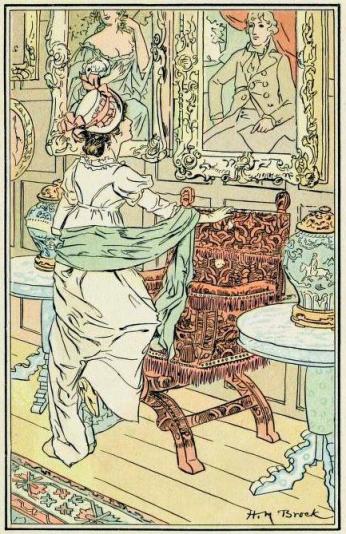
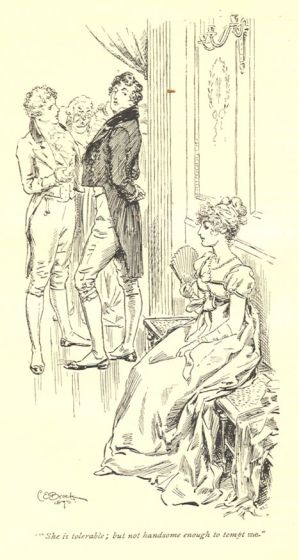

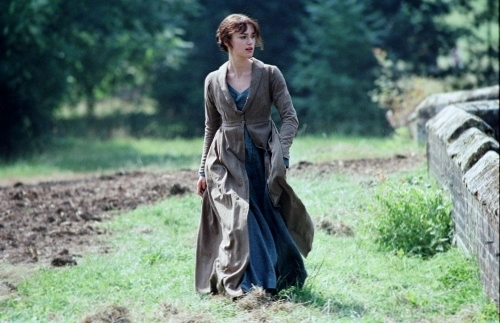
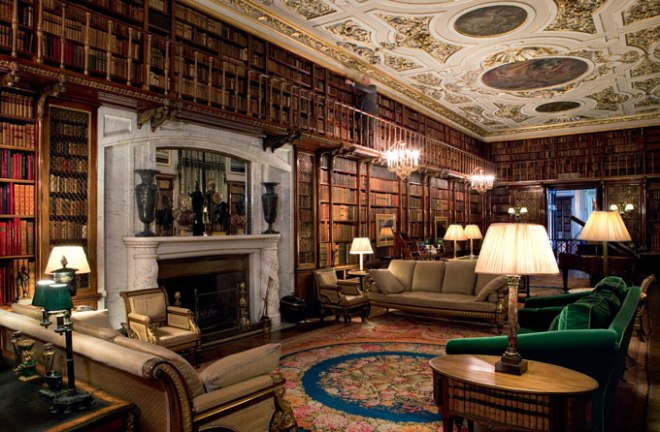
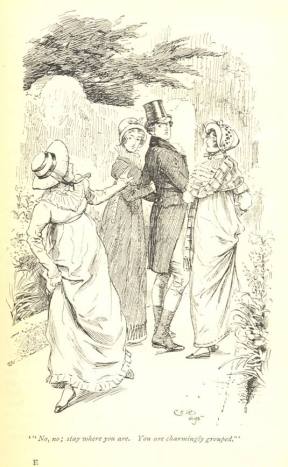
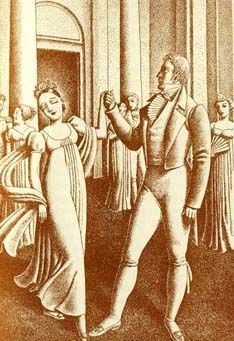
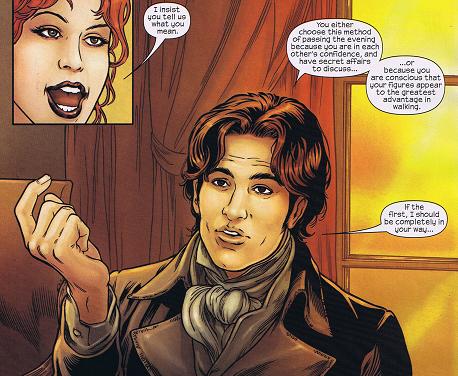
Thank you for this, Deb!!! I can’t adequately describe how much I enjoyed it. I fall much into your camp in terms of the whens and hows of Elizabeth and Darcy making their respective leaps.
I heard a lecture recently about film adaptations that referred to Stendahl’s notion of crystallization – that moment (forgive my poor paraphrasing) when an individual realizes that the person they are attracted to/like/love, may have some perfections after all…
And your comments on Darcy smiling brought to my mind John Mullan’s recent speech at the AGM, where he assured us (having counted… or someone having counted) that Darcy smiles in the book TEN TIMES… and eight of those are directed towards Lizzy. (And those only the ones Miss Austen tells us about!)
I have spent the last couple of years poring over these passages, as the project I am currently writing deals, in half the storyline, with Darcy’s and Lizzy’s relationship as seen from the Darcy family perspective. And I always think back to the passages that refer in some manner to Elizabeth being “determined” to dislike Mr Darcy! Doesn’t speak to being unaffected to me, LOL. I also think of Caroline Bingley swearing that Mr Darcy is not to be teased — and yet she (and others like COL Fitzwilliam) spend half the book teasing him with no great repercussion.
The timing of this was wonderful for me – a breath of fresh air – as I have only recently been catching up on reading essays in JASNA’s Persuasions. And I just finished one that purported – and shows lots of rational examples – that Elizabeth was not the least bit attracted to Darcy until after both learning of his character alteration, and of his status hitting her between the eyes. It is only at the very end (and they mean the very end) that she realizes she COULD love him… and hadn’t even reached that state yet by the novel’s close. I read the entire article, but much of it was a blur as I was too busy shaking my head much of the time. And I recalled being in a college speech class where our professor provided us examples of the same piece of writing providing rational support for two opposite and extreme opinions – only proving that a collection of discrete facts without greater context can be made to ‘prove’ anything.
Oops! Sorry I’ve gone on so long. Can you tell this is a topic close to my heart??? In the end I just want to say, thanks again!!! And bring on Volume II !!!
LikeLiked by 1 person
Lovely comments Tess! – glad you found this to your liking – I could have written so much more – but just trying to give the bare-bones of what Austen wrote… I know the essay you are referring to – have heard the talk as well – and have talked to a number of people who believe that Elizabeth has no initial feelings for Darcy but learns to “esteem” him as Elinor would say… I just completely disagree – I can only assume those who think that never had the teenage experience of being humiliated by a handsome someone in a position of power and then spending the rest of your life dissing the guy and insisting he is the most “disagreeable” man in the world and you wouldn’t ever, ever dance with him for all the tea in China, etc, etc…… Darcy unnerves Elizabeth from the beginning and thankfully her ready wit saves her from appearing like she cares a hoot… but of course it just proves the case in my mind! The two of them are “determined” to have nothing to do with the other as you say! Volume II brings on a completely different Darcy – he cannot stay away, and Elizabeth is both confused and gratified, as we shall see…
Thanks Tess – you can never write anything too long!
Deb
LikeLike
I have seen similar essays written, and I can only shake my head in annoyance. HAVE THEY READ THE BOOKS? I am glad that I am not the only one who feels this way. Elizabeth LOVES Darcy by the end. Period.
LikeLike
I’m so glad you’re still celebrating P&P, and I really like your analysis of how Elizabeth is intensely aware of Darcy from the very beginning. The other thing at Pemberley that changes her is what she hears of his character from Mrs. Reynolds. “What praise is more valuable than the praise of an intelligent servant?”
I’m looking forward to your post on Volume 2. And this is crucial: “the best way to celebrate the book in my mind is to just find a quiet corner somewhere and re-read it.” Let’s do the same for Mansfield Park!
LikeLike
Thanks for stopping by Sarah! – and yes, I agree about Mrs. Reynolds and her affect on Elizabeth, and then she sees that portrait and she is pretty much doomed from then on!
I am just getting this all just under the 2013 wire…my notes have been sitting here since January! – I have been following your wonderful posts on P&P – you gave it its just due and more – however will we keep up the excitement with Mansfield Park?! [though I do love that book, it does not as we know have a Mr Darcy anywhere in sight…]
LikeLike
I’m happy to be celebrating P&P all year long, and I can’t imagine that we’ll ever run out of things to say about it. Thanks for your kind words about my P&P posts. I hope the excitement will continue with MP — it doesn’t have Mr. Darcy, but it’s certainly controversial.
LikeLike
How true about never running out of things to say about P&P! – all my yearlong plans of P&P reporting went out the window I am afraid with real Life intruding all too often this year – so very grateful to you for doing such a fine job with it all! I love Mansfield Park, I am a card-carrying Fanny “fan” – but it certainly lacks the humor of all the other books, and so it shall be a more serious year of contemplation, and hopefully generate a better understanding and appreciation of Jane Austen at her very best. I am looking forward to the AGM in Montreal [closer for both of us!], as I know Elaine Bander and her team shall make it a memorable celebration!
LikeLike
I agree that MP is JA at her very best, and most profound. I’m really looking forward to Elaine’s AGM, too, and it’s nice that it’s not too far to travel (much as I loved the LA, Tucson, Vancouver, and other far-away AGMs). Did you get my message on Facebook about the series I’m planning on 200 years of Mansfield Park? I’d love to have a guest post from you, if you’re interested and have time.
LikeLike
Pingback: albacmblog
Pingback: Pride and Prejudice – Jane Austen | Victória Solano de Almeida - ENGLISH IV
“It has been coming on so gradually, that I hardly know when it began. But I believe I must date it from my first seeing his beautiful grounds at Pemberley.”
Yes Deb, this quotation does have a tongue in cheek quality to it ,but on the other hand the meaning of love, relationships and marriage was very different from what we would describe it today. Jane Austen’s novels and characters are timeless in that they have real human attributes but we also have to understand them in the context of the Georgian period..It is too easy to get it wrong if we interpret them too closely from our 21st century point of view.
LikeLike
Hello Tony – I agree that there were different marriage and relationship customs for the time, and I was not intending to comment on the often harsh realities for women – Charlotte’s story tells the tale all too well, and Elizabeth’s not understanding her friend’s decision tells us more about Elizabeth – her prejudices, blindness and immaturity – than anything, and a contemporary reader would have instantly understood it all – and why modern readers have such trouble with Charlotte’s “choice” of Mr. Collins. I was just writing on Darcy’s clearly described feelings about Elizabeth, and her reactions to him – Austen making it all very clear to the reader that these two people in the same room together is powerful indeed! – and not a new story at all – one only look at Much Ado about Nothing to see the perfect model. If nothing else, you can see it in the words that Elizabeth uses or the words the narrator uses for anything she says or thinks about Darcy – it is a very passionate, strong vocabulary!
Thanks for your comments Tony – I DO agree with you that we cannot let our overly romantic sensibilities intrude on our reading – but even in understanding the times, it is all still there, and Austen was having her fun in creating this pair of Lovers! – if you have any doubts, just re-read Emma, where the Lover of that tale has been hiding-in-plain-sight the whole time, but if you look very, very closely, you will find him early on… but I digress! – Mr. Knightley shall have to wait for his own turn!
LikeLiked by 1 person
It has only just occurred to me in a recent rereading of P and P, that Charlotte was far more intelligent than Elizabeth. In fact, I would go so far as to say that Elizabeth merely considered herself intelligent and perceptive, whilst often demonstrating the exact opposite, whereas Charlotte simply WAS without having to show off. After all, later in the book, Elizabeth heartily regrets her “saucy speech” to Mr. Darcy, after discovering the lengths he took to save Lydia from disgrace and Wickham from, presumably, bankruptcy. And so Elizabeth’s judgement of Charlotte’s decision to marry Mr. Collins, does actually demonstrate her own inability to see different viewpoints. This is brilliantly foreshadowed when Charlotte is discussing how a woman should express love early on in the book. In fact, EVERYTHING Charlotte predicted came true, and almost all of Elizabeth’s presumptions were proved false– often in catastrophic ways. Charlotte said that if Jane didn’t show enough affection, she would lose Bingley. This came true. She said that Elizabeth shouldn’t be rude to Darcy just because she liked Wickham; Elizabeth ignored this advice during Darcy’s disastrous proposal. Charlotte is nowhere near as appreciated as Elizabeth, and she should be.
LikeLike
Hello Deborah, Love how you are re-reading P&P again and finding more and more each time – it IS a fountain of brilliance! And I agree with you about Charlotte Lucas – she does have the pulse of things and Elizabeth just doesn’t have her wisdom – takes the whole book for her to see clearly – this is what makes re-reading so pleasurable – we see Elizabeth’s missteps all along the way, just as with Emma… they are both very short-sighted…
Thanks for your wonderful comments – nice to see someone finding so much joy in Austen!
LikeLike
I cannot believe this only has 4 likes so far. If I could like it multiple times, I would. I agree with your reading that Elizabeth was definitely interested in Darcy before she saw his house. I love how Austen describes the land though, because a woman of that time would unfortunately have to rely on their husbands or fathers’ land for their security. She may have been interested in Darcy, but the giant estate and a promise of lifetime security does not hurt, even though they are not Elizabeth’s top priorities. I always felt that she was more interested in him after seeing how well-loved he was by all of his staff, and then brushed it off as being impressed by his extensive grounds. Thanks for posting!
LikeLike
Hello Pemberley – thanks for commenting! I agree that Elizabeth is very sly here – she does learn about Darcy from the servants, but her mind was very willing to be turned at that point! – after all, she had memorized his letter and was quite receptive to looking at him differently, especially after seeing his grounds! – he had proposed to her after all and for the second half of the book, she is in doubt that he still feels the same way about her and is nearly silenced in his presence…
Stay tuned for Part II – coming soon, I promise…
LikeLike
Pingback: Mr. Darcy’s Feelings; Or, More on the Inner Life of Jane Austen’s Hero…Part II | Jane Austen in Vermont
Pingback: Death Comes to Pemberly Promotional Pictures | The Consulting Detective
Pingback: Death Comes To Pemberley Promotional Pictures | The Consulting Detective
Pingback: Mr. Darcy’s Diary by Amanda Grange | The Wordsmith's Review
Pingback: Mr. Darcy’s Feelings; Or, More on the Inner Life of Jane Austen’s Hero…Part III | Jane Austen in Vermont
A fantastic article! I am rereading this book a second time this year (and within a month or two of having finished it a couple of months ago!) and poring over every paragraph. And yet there were many parts that I missed, or read too quickly. Words cannot express my love for this “light, bright and sparkling” gem, and even though I begrudgingly acknowledge that it probably isn’t her “best” novel, technically speaking (I strongly suspect that Emma and Persuasion, which I am also reading now for the first time, are stronger novels), it is the one I revert to with a smile. The number of times I have burst out laughing when reading P and P, or smiled in complacent wistfulness at the growing love between Elizabeth and Darcy, does not need counting.
LikeLike